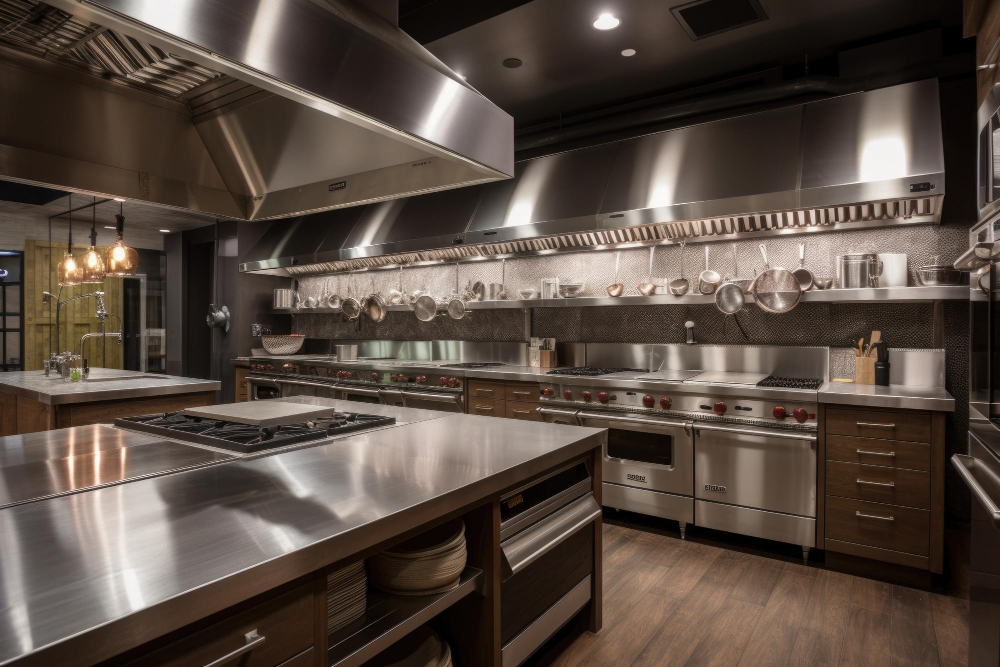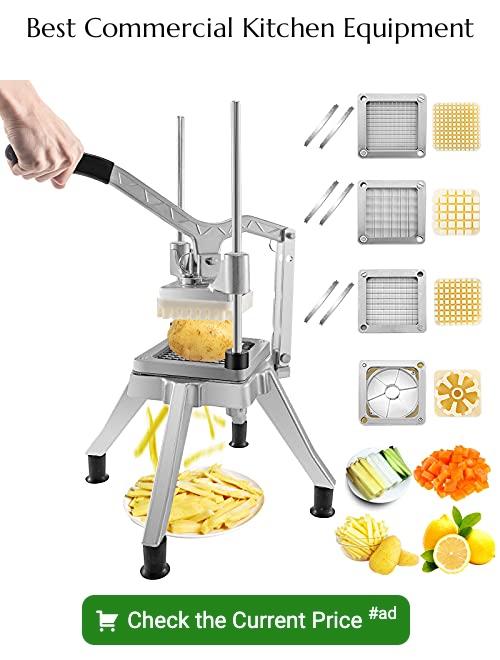Last updated on
Discover the world of incubator kitchens and how they foster culinary creativity, support budding food entrepreneurs, and contribute to a thriving food industry.
An incubator kitchen is a term that has been gaining popularity in the food industry recently. It’s a concept that has revolutionized the way food entrepreneurs start and grow their businesses.
But what exactly is an incubator kitchen? In this article, we’ll delve into the definition of an incubator kitchen, its benefits, and how it differs from other commercial kitchens. So whether you’re a budding chef looking to start your own business or simply curious about this innovative concept, keep reading!
What's Inside
Defining Incubator Kitchens

These facilities offer a range of services, including access to professional-grade equipment, storage space, business support services such as marketing and accounting assistance, networking opportunities with other food industry professionals and potential investors.
Unlike traditional commercial kitchens where chefs or caterers rent out space for their exclusive use on an ongoing basis at a fixed cost per month or year; incubator kitchens operate on a membership model. Members pay fees based on usage time rather than renting out the entire facility for themselves.
The concept of incubator kitchens has been around since the 1950s when they were first established in Europe as part of efforts to promote small-scale entrepreneurship. However, it wasn’t until recently that they gained popularity in North America due to increased interest in local foods and sustainable agriculture practices.
The Origin of Incubator Kitchens

The concept of incubator kitchens originated in the United States during the 1950s and 1960s when shared commercial kitchen spaces were created to support small-scale food businesses. These early incubators provided a space where entrepreneurs could rent time on equipment they couldn’t afford to buy themselves, such as large ovens or industrial mixers.
Over time, these shared kitchen spaces evolved into more sophisticated models that offered additional services like business coaching and marketing support. Today’s modern incubator kitchens are designed to provide a comprehensive range of resources for food entrepreneurs at all stages of development.
The growth of the local food movement has also contributed significantly to the rise in popularity of incubator kitchens. Consumers are increasingly interested in supporting small-scale producers who use locally sourced ingredients and sustainable practices.
Incubators offer an ideal platform for these types of businesses by providing access to affordable commercial-grade equipment, professional facilities, mentorship programs and networking opportunities with other industry professionals.
Key Features of Incubator Kitchens

They offer several key features that set them apart from traditional commercial kitchens. One of the most important features is flexibility.
Incubator kitchens allow chefs and food business owners to rent space on an as-needed basis, which means they can scale their operations up or down depending on demand.
Another key feature of incubator kitchens is access to professional-grade equipment and facilities at affordable rates. This includes everything from ovens, stovetops, refrigerators, freezers, dishwashers and more.
In addition to providing access to top-notch equipment and facilities at reasonable prices; incubator kitchen operators also offer mentorship programs where experienced professionals in the industry guide new entrants through every stage of setting up their businesses – from recipe development all the way through marketing strategies.
Types of Incubator Kitchens

The most common types of incubator kitchens include shared-use commercial kitchens, ghost or virtual kitchens, and mobile/incubator food trucks.
Shared-use commercial kitchen spaces are the most popular type of incubator kitchen. They provide a fully equipped space for entrepreneurs who need access to professional-grade equipment but cannot afford the high costs associated with setting up their own facility.
Ghost or virtual kitchens are another type of incubator kitchen that has gained popularity in recent years. These facilities allow businesses to operate without a physical storefront by providing them with a licensed commercial kitchen space where they can prepare their food for delivery only.
Mobile/incubator food trucks offer an alternative option for entrepreneurs who want more flexibility and mobility than traditional brick-and-mortar locations can provide. These mobile units have all the necessary equipment needed for cooking on-the-go while still meeting health department regulations.
Choosing the right type of incubation program depends on your business goals and budget constraints as well as your target market’s preferences.
Importance of Incubator Kitchens

These kitchens offer shared commercial kitchen space, equipment, storage facilities, and business support services such as marketing assistance and mentorship programs. The importance of incubator kitchens lies in their ability to provide a low-risk platform for aspiring chefs or bakers who lack the financial resources or experience required to launch their own brick-and-mortar establishments.
Moreover, incubator kitchens also help reduce barriers that prevent small-scale producers from entering the market by offering access to licensed commercial kitchen spaces that meet health department regulations. This allows them to produce high-quality products at scale while complying with safety standards.
Another significant benefit of incubator kitchens is networking opportunities they provide through events like cooking classes or pop-up markets where entrepreneurs can showcase their products directly to consumers. This exposure helps build brand awareness and customer loyalty which are essential factors for any successful business venture.
Key Components of an Incubator Kitchen

It’s a supportive environment that provides food entrepreneurs with the resources they need to succeed. Here are some key components of an incubator kitchen:
1. Shared Space: An incubator kitchen typically has shared spaces such as prep areas, storage facilities, and equipment.
2. Business Support Services: Many incubators offer business support services such as marketing assistance, legal advice, and accounting services.
3. Training Programs: Incubators often provide training programs on topics like food safety regulations or recipe development.
4. Networking Opportunities: Being part of an incubator community means having access to networking opportunities with other food entrepreneurs and industry professionals.
5. Access to Funding Sources: Some larger-scale kitchens may also have funding sources available for their tenants in the form of grants or loans.
How an Incubator Kitchen Works

These spaces typically come equipped with all the necessary equipment and resources needed for food production, such as ovens, stovetops, refrigerators, and storage areas.
In addition to physical resources, incubator kitchens also offer a range of support services that help entrepreneurs grow their businesses. This includes access to business coaching and mentorship programs that provide guidance on everything from marketing strategies to financial planning.
One of the key benefits of an incubator kitchen is its flexibility. Entrepreneurs can rent space on an hourly or monthly basis depending on their needs.
This allows them to scale up or down as demand for their products fluctuates without having the burden of long-term leases.
Incubator kitchens provide a low-risk environment where aspiring chefs can test new recipes and build a customer base before investing in expensive equipment or committing themselves financially.
Benefits for Food Entrepreneurs

Firstly, they provide access to commercial-grade equipment and facilities that would otherwise be too expensive for small businesses to afford. This means that budding chefs can experiment with new recipes and techniques without having to invest in costly equipment upfront.
Secondly, incubator kitchens often have established relationships with suppliers, which allows food entrepreneurs to purchase ingredients at lower prices than if they were buying them independently. This helps reduce the cost of production and increases profit margins.
Thirdly, incubator kitchens provide a supportive community where like-minded individuals can share ideas and collaborate on projects. Networking opportunities are abundant in these spaces as there is always someone who has experience or knowledge about something you may need help with.
Fourthly, many incubator kitchens offer training programs or workshops on topics such as business planning, marketing strategies or financial management skills – all essential components when starting your own food business.
Being part of an incubator kitchen also provides exposure through events hosted by the space itself or other partners within their network; this could lead to potential customers discovering your products/services more easily than if you were working alone from home.
Target Markets for Incubator Kitchens

These individuals may have different levels of experience in the culinary industry but share a common goal: to start or grow their own food business. Incubator kitchens provide an ideal environment for these aspiring entrepreneurs by offering affordable access to commercial-grade equipment and facilities that would otherwise be out of reach.
In addition to providing access to resources such as kitchen space and equipment, incubator kitchens also offer mentorship programs and networking opportunities with other like-minded individuals in the industry. This allows budding food entrepreneurs not only access but also exposure within the community they are trying so hard to break into.
Moreover, incubator kitchens can serve as a stepping stone for those who want more than just renting kitchen space; it’s an opportunity for them to test their products on real customers without having all the overhead costs associated with opening up their own brick-and-mortar establishment right away.
Overall there is no one-size-fits-all approach when it comes down targeting markets for incubators since each facility has its unique features catering towards specific needs depending on location or services offered.
Business Models for Incubator Kitchens

Some incubator kitchens charge a flat fee for kitchen rental space, while others take a percentage of sales from food entrepreneurs who use their facilities. There are also non-profit organizations that offer subsidized rates to support low-income or disadvantaged communities.
Another popular model is where incubator kitchens provide additional services such as marketing and branding assistance, product development guidance, legal advice or access to funding opportunities in exchange for equity in the businesses they help launch.
Some incubators may focus solely on providing kitchen space while others may offer co-working spaces with shared office amenities like printers and conference rooms. The key is finding an incubator that aligns with your business needs and goals.
It’s important to research various options before committing to one particular model since each has its own advantages and disadvantages.
Costs Associated With Incubator Kitchens

It’s important to note that there are costs associated with using an incubator kitchen. These costs can vary depending on the location, size of the kitchen, and services provided.
Some incubator kitchens charge a flat hourly rate for access to their facilities while others may require monthly or yearly membership fees. In addition to these basic charges, some kitchens may also charge additional fees for storage space or equipment usage.
It’s essential that you carefully review all of the costs associated with using an incubator kitchen before signing up as they can add up quickly and impact your bottom line significantly. However, keep in mind that even with these added expenses; utilizing an incubator kitchen is still often more affordable than renting out your own commercial space and purchasing expensive equipment outright.
How to Find an Incubator Kitchen

With so many options available, it can be overwhelming to know where to begin. Here are some tips on how to find an incubator kitchen that suits your needs:
1. Do Your Research: Start by researching online for local incubator kitchens in your area or nearby cities.
2. Attend Food Events: Attend food events and conferences in your area as they often have exhibitors from various culinary organizations including those who run Incubator Kitchens.
3. Network with Other Entrepreneurs: Reach out and network with other entrepreneurs who have used or are currently using an Incubator Kitchen facility.
4. Contact Local Business Development Centers: Check if there are any local business development centers that offer resources for small businesses such as access to commercial kitchens like Incubators.
5 .Visit Potential Facilities: Once you’ve narrowed down potential facilities, schedule a visit and tour of each one before making any decisions.
Selecting the Right Incubator Kitchen

With so many options available, it can be overwhelming to choose the one that best suits your needs. Here are some factors to consider when selecting an incubator kitchen:
1. Location: Choose an incubator kitchen that is easily accessible and located in a convenient area.
2. Facilities: Look for a facility with state-of-the-art equipment and ample storage space.
3. Services Offered: Consider what services are offered by the incubator kitchen such as marketing support, mentorship programs, networking opportunities, etc.
4. Cost Structure: Evaluate different cost structures of various kitchens before making a decision on which one fits within your budget.
5. Rules and Regulations: Ensure you understand all rules and regulations set forth by each potential option before committing yourself fully.
Rules and Regulations

These regulations ensure that the food produced in these kitchens is safe for consumption. Incubator kitchens must adhere to strict guidelines regarding cleanliness, sanitation, storage of ingredients and equipment maintenance.
In addition to health department regulations, incubator kitchens may have their own set of rules that tenants must follow. For example, some may require tenants to provide proof of liability insurance or limit the types of foods that can be prepared on-site.
It’s important for entrepreneurs who plan on using an incubator kitchen facility to familiarize themselves with all applicable rules and regulations before signing a lease agreement. Failure to comply with these requirements could result in fines or even closure of the business.
Health and Safety Standards in Incubator Kitchens

As these kitchens are shared spaces, it’s crucial to maintain a clean and safe environment for all users.
Incubator kitchen operators must adhere to strict regulations set by local health departments. These regulations cover everything from food handling practices, sanitation procedures, pest control measures, ventilation systems, waste management protocols to equipment maintenance requirements.
Food entrepreneurs who use incubator kitchens must also follow these guidelines when preparing their products. They need to ensure that their ingredients are stored properly at the right temperatures; utensils are cleaned thoroughly before use; surfaces are sanitized regularly during cooking processes; cross-contamination is avoided between different foods or allergens.
In addition to complying with regulatory requirements for food safety standards in an incubator kitchen setting can help build trust among customers while reducing liability risks associated with product recalls or lawsuits due to contamination issues.
Networking Opportunities

These kitchens provide a platform for like-minded individuals to connect, share ideas and experiences, and collaborate on projects. Incubator kitchen owners often organize events such as cooking classes, workshops, tastings or networking sessions where members can meet other professionals in the industry.
These events not only help entrepreneurs build relationships with potential customers but also create an environment where they can learn from each other’s successes and failures. Networking opportunities offered by incubator kitchens allow food entrepreneurs to expand their knowledge base while building valuable connections within the industry.
Moreover, these networking events may lead to new business partnerships or collaborations between different businesses operating within an incubator kitchen space. By working together on joint ventures or cross-promotions with fellow tenants in an incubator kitchen facility; small-scale businesses have a better chance of success than if they were operating alone.
Networking is essential for any entrepreneur looking to grow their business successfully; it provides access to resources that would otherwise be unavailable without collaboration efforts among peers in similar industries.
Supporting Local Food Communities
They also play an important role in supporting local food communities. By providing affordable kitchen space, incubator kitchens allow small-scale producers to bring their products to market without the high overhead costs of renting or owning a commercial kitchen.
Many incubator kitchens offer training programs and workshops on topics such as recipe development, marketing strategies, and business planning. These resources help entrepreneurs build the skills they need to succeed in the competitive world of food production.
Moreover, by bringing together like-minded individuals who share a passion for good food and sustainable agriculture practices, incubator kitchens foster collaboration among members of local communities. This creates opportunities for partnerships between farmers’ markets vendors or restaurants that source locally grown ingredients from nearby farms.
Challenges Faced By Incubator Kitchens

One of the biggest hurdles is finding a sustainable business model that works for both the kitchen and its tenants. Many incubator kitchens operate on a non-profit basis, relying on grants or donations to cover operating costs.
This can make it difficult to provide affordable rental rates for food entrepreneurs who are just starting out.
Another challenge faced by incubator kitchens is maintaining high health and safety standards while accommodating multiple businesses with varying needs and levels of experience in food handling. Incubators must ensure that all tenants comply with local regulations, which can be time-consuming and costly.
Competition among incubator kitchens has increased as more facilities have opened up across the country. This means that each kitchen must find ways to differentiate itself from others in order to attract new clients.
Future Trends in Incubator Kitchens
In the future, we can expect to see more specialized incubator kitchens catering to specific niches such as vegan or gluten-free cuisine. Technology will play a larger role in these spaces with smart appliances and software that streamline operations and improve efficiency.
Another trend is an increased focus on sustainability with many incubator kitchens implementing eco-friendly practices such as composting and reducing food waste. This not only benefits the environment but also helps entrepreneurs save money by minimizing their expenses.
Furthermore, there will be a growing emphasis on community-building within these spaces through events like cooking classes or pop-up dinners where chefs can showcase their culinary skills while networking with potential customers.
It’s clear that incubator kitchens are here to stay and will continue to shape the future of our food industry by providing opportunities for aspiring chefs while promoting innovation in culinary arts.
FAQ
What is the incubator kitchen?
An incubator kitchen is a certified, affordable kitchen space designed to provide small food businesses a competitive advantage in the local marketplace for food preparation.
How big are incubator kitchens?
Incubator kitchens are predominantly small, with the majority operating in less than 5,000 square feet of space and nearly half under 3,000 square feet.
What is the use of incubator in food industry?
In the food industry, incubators are used to support start-up endeavors by providing a secure environment to develop ideas, recipes, business skills, packaging, production, distribution, and protection from obstacles, ultimately fostering business growth.
What do incubators do?
Incubators help maintain optimal temperature and humidity for babies, preventing hypothermia and skin problems.
What are the benefits of using an incubator kitchen for food entrepreneurs?
Incubator kitchens provide food entrepreneurs with affordable, well-equipped spaces and valuable resources to grow their businesses more efficiently and cost-effectively.
How do food startups typically find and rent space in incubator kitchens?
Food startups typically find and rent space in incubator kitchens by searching online platforms and contacting the facilities for available spaces.
What equipment and resources are commonly provided by incubator kitchens?
Incubator kitchens commonly provide equipment and resources such as commercial-grade kitchen appliances, storage facilities, mentorship, and business guidance for food startups.





